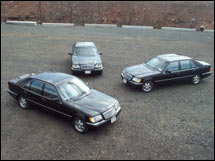New York (CNN/Money) – Sure, you'd love some of life's sweeter toys – a Mercedes or a yacht, diamond jewelry, maybe a ranch house getaway. But the prices for such items are enough to put a chill on your shopping fantasies.
It's time to thaw out. Adventurous shoppers willing to test the frontier of merchandising may find their dream wares selling on the cheap. No, we're not talking about some 24-hour shopping network or a discounter's Web site.
We're thinking about the government.
 |
|
| 1997 Lamborghini Diablo seized when illegally imported. Sold for $84,000. |
Uncle Sam auctions off $3.6 billion worth of goods each year, according to Pew Research Center. Many of these items come from public agencies - local police departments, the Federal Bureau of Investigation and the Internal Revenue Service - which seized the merchandise from drug dealers, tax cheats and other criminals.
In fact, in the coming year, the government will host dozens of auctions at various locations from San Juan, Puerto Rico to Sparks, NV. And if you don't get a great deal, you may get something better: an item that makes for an interesting conversation piece, be it a car seized in a drug raid, art illegally smuggled into the country or boats owned by fugitive insurance cheats.
Golf courses, race horses and 82 crates of grave markers
In the past, the government has sold off such unusual items as a race horse for $264,000; the Indian Wells golf course, home of the Bob Hope Classic tournament ($25.5 million) and a Salvador Dali painting "Mao Marilyn" ($111,000) that was seized when Colombian drug traffickers tried to import the art into the country. Also sold were some 21 luxury cars owned by Martin Frankel the "fugitive financier" who bilked insurance companies out of a cool $200 million and 82 crates of cemetery headstones ($13,000 for the bunch).
Naturally, with such a range of items what's considered a deal is in the eyes, and wallets, of buyers who attend the sales.
Deals for those in the know
 |
|
| Indian Wells Country Club seized in fraud scam. Sold for $25.5 million. |
Just ask Eric Knight who flies to Fort Lauderdale four times a year to go to the many auctions run by the U.S. Treasury Department. Knight, an optometrist from Milwaukee, became an avowed auction-goer a few years ago when he bought 4,000 pair of high-end designer eyeglasses that Knight said typically sold for $300 to $500 a pair depending on where you got them. (He picked them up for about $100, the same amount he charges clients who now buy them.)
"Patients just love them," said Knight. "It's a win-win for everyone."
But his biggest coup to date were the two Cannondale bikes he bought earlier this year for $800 total. Together, they're worth more than 10 times that – about $8,500, said Knight, who regularly competes in men's triathlons in which contestants swim, bike and run.
Buyer beware
That said, for every Cannondale picked up on the cheap, there are plenty of items that sell too high. In some cases, certain kinds of items, particularly cars and trucks, attract too many buyers.
"Sometimes the auctions are very competitive," said Britney Sheehan, spokesperson for EG&G Technical Services, which runs the seized-property auctions for the U.S. Treasury Department, the FBI and U.S. Customs Service as well as several other federal agencies.
 |
|
| Three of the 21 vehicles taken from 'Fugitive Financier' Martin Frankel. All vehicles sold for $757,000 total. |
The best way to score a deal? Know the lay of the land.
The first step is knowing what to pay for, and what you can get for free.
If you're simply looking for information about auctions, you should never have to spend money to find out when and where they're being held. The U.S. Treasury Department alone, for example, hosts auctions in various parts of the country nine times a year, selling anywhere from $12 million to $20 million (which isn't part of that $3.6 billion in online sales) worth of seized goods a year. Go to the agency's Web site for a list of upcoming auctions. You can sign up for free e-mail updates about upcoming auctions, too.
If you can't make it to a live auction, there are plenty of government Web sites that auction goods online. The U.S. Marshals Service, which sells about 20,000 seized items a year, posts its wares at its Web site and at bid4assets, where you can currently bid for a Rolls Royce Silver Spirit. At Propertyroom.com, you'll find less pricey objects, such as paint ball guns and Palm Pilots, seized by local police departments.
No matter what you buy, you should try to do some homework before you start bidding to ensure you're really getting a good deal.
 |
|
| Lyme, CT home from anti-smugglnig bust. Sold for $3.4 million. |
Auctions should provide vehicle identification numbers and mileage information and you can have someone inspect (but not drive) cars at live auction previews, which are typically held for two days before the sale.
According to Sheehan, jewelry tends to yield the best deals, selling at wholesale prices because shoppers are wary about buying something they think may be a fake. She notes shoppers should rest easy.
"We get third-party appraisals so buying it is the same as going to a trusted jeweler," she says. "The government has to have it appraised to know its worth."

|

